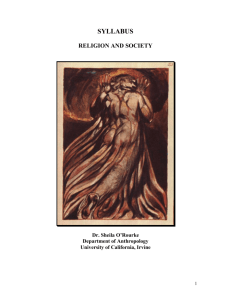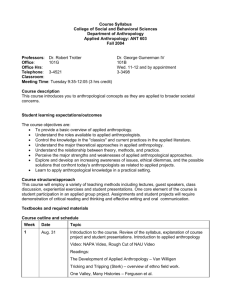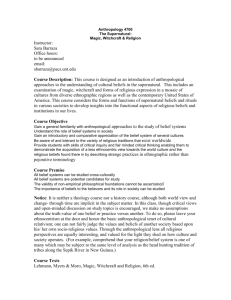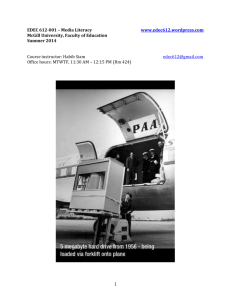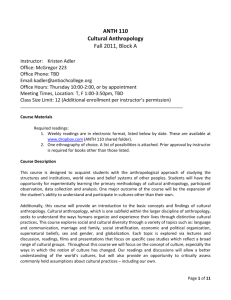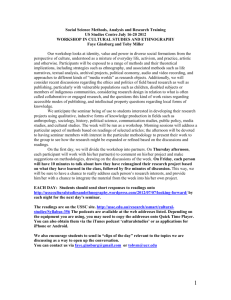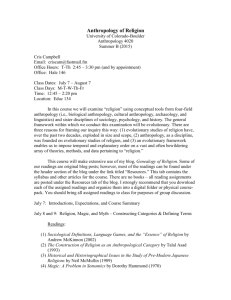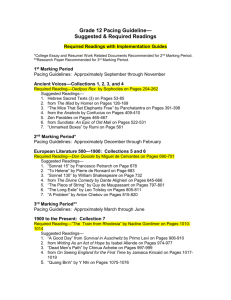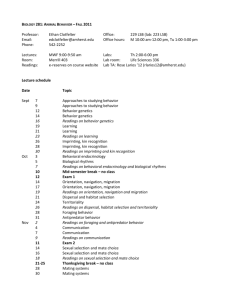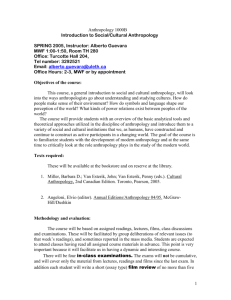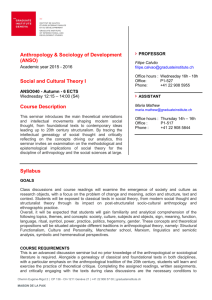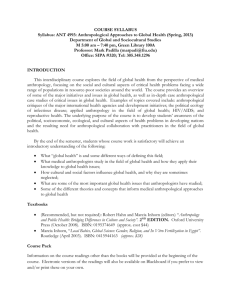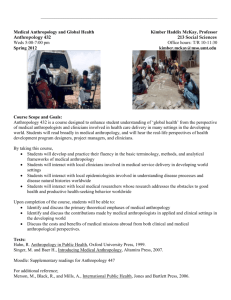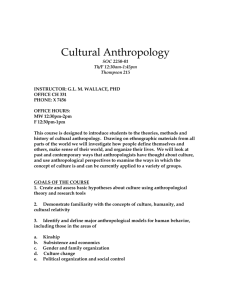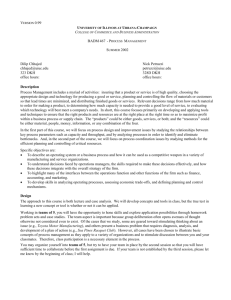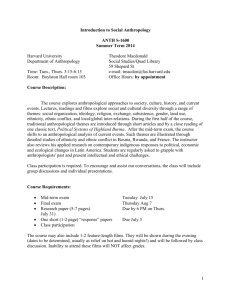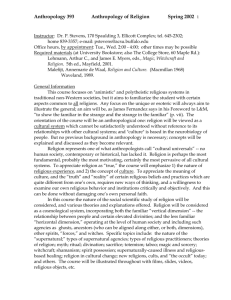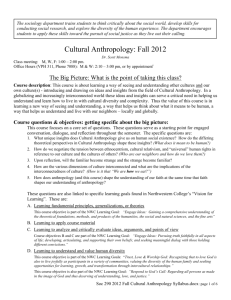anth30320151
advertisement
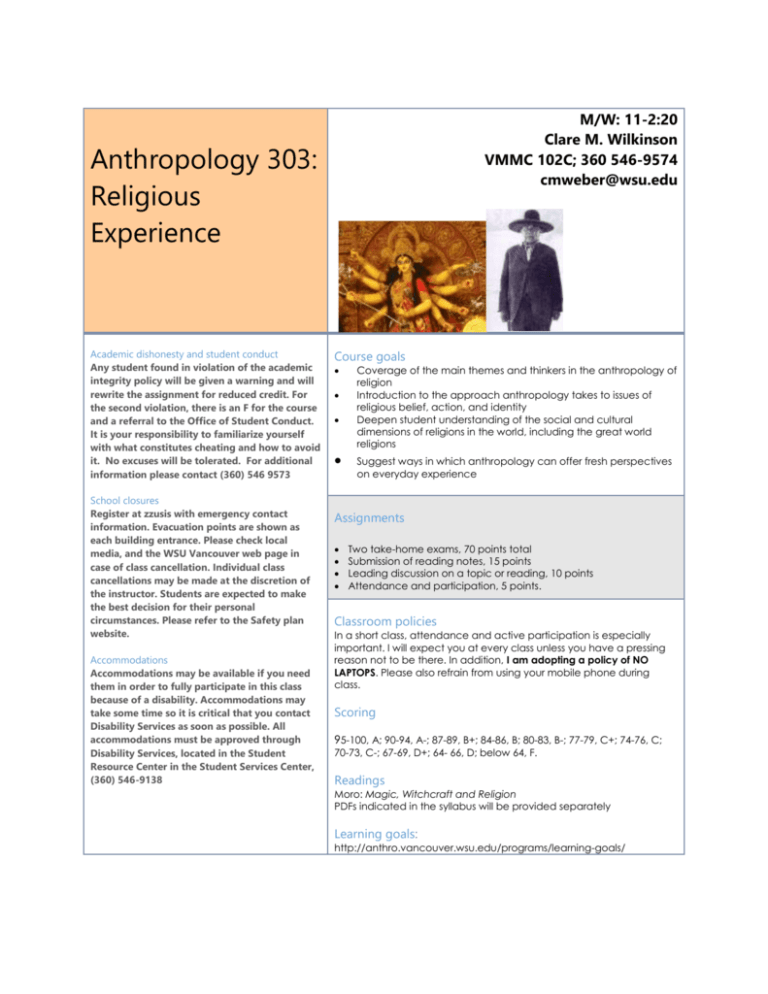
M/W: 11-2:20 Clare M. Wilkinson VMMC 102C; 360 546-9574 cmweber@wsu.edu Anthropology 303: Religious Experience Academic dishonesty and student conduct Any student found in violation of the academic integrity policy will be given a warning and will rewrite the assignment for reduced credit. For the second violation, there is an F for the course and a referral to the Office of Student Conduct. It is your responsibility to familiarize yourself with what constitutes cheating and how to avoid it. No excuses will be tolerated. For additional information please contact (360) 546 9573 School closures Register at zzusis with emergency contact information. Evacuation points are shown as each building entrance. Please check local media, and the WSU Vancouver web page in case of class cancellation. Individual class cancellations may be made at the discretion of the instructor. Students are expected to make the best decision for their personal circumstances. Please refer to the Safety plan website. Accommodations Accommodations may be available if you need them in order to fully participate in this class because of a disability. Accommodations may take some time so it is critical that you contact Disability Services as soon as possible. All accommodations must be approved through Disability Services, located in the Student Resource Center in the Student Services Center, (360) 546-9138 Course goals Coverage of the main themes and thinkers in the anthropology of religion Introduction to the approach anthropology takes to issues of religious belief, action, and identity Deepen student understanding of the social and cultural dimensions of religions in the world, including the great world religions Suggest ways in which anthropology can offer fresh perspectives on everyday experience Assignments Two take-home exams, 70 points total Submission of reading notes, 15 points Leading discussion on a topic or reading, 10 points Attendance and participation, 5 points. Classroom policies In a short class, attendance and active participation is especially important. I will expect you at every class unless you have a pressing reason not to be there. In addition, I am adopting a policy of NO LAPTOPS. Please also refrain from using your mobile phone during class. Scoring 95-100, A; 90-94, A-; 87-89, B+; 84-86, B; 80-83, B-; 77-79, C+; 74-76, C; 70-73, C-; 67-69, D+; 64- 66, D; below 64, F. Readings Moro: Magic, Witchcraft and Religion PDFs indicated in the syllabus will be provided separately Learning goals: http://anthro.vancouver.wsu.edu/programs/learning-goals/ WEEK AND DATE 1 Jun 22/24 2 3 4 Jun 29/Jul 1 Jul 6/8 Jul 13/15 MONDAY Introduction, what is religion? Some important anthropological considerations. WEDNESDAY Symbolism and introduction to ritual READING: Eller Religion and power: ritual continued, sources of supernatural power READING: Turner p. 90, Mason, Myerhoff, Gmelch Religion and the body READING: Wolf, Geertz, Beattie Strange beings, the problem of death READING: Lock, Hoodfar, Nanda PDF [Kapchan recommended] The problem of evil and affliction: witchcraft READING: Lewis p. 190, Furst and Coe, Harner Shamanism, healing and magic I READING: Foster, Thomas, Hewlett, McPherson READING: Vitebsky, Greenfield, de la Portilla READING: Metcalf, Conklin, Norget Possession cults, transformative experience 5 Jul 20/22 Shamanism, healing and magic II Spiritual and temporal crisis, revitalization. 6 Jul 27/29 READING: Fadiman, Gilmore, Hutson New religions READING Wallace PDF, Mullins Global and contemporary trends in religion READING: William Lewis, Fluehr-Lobhan READING: Darlington, Erzen, Buckser NOTE ON ASSIGNMENTS One midterm and one final take-home exam 30 points and 40 points each (total 70 points) The first exam will be made up of two sections covering the different material in the course. You will be asked to pick one question from each section plus one additional question of your choice. In the final, you will choose three questions from three sections, plus one additional question of your choice. Each question for the MIDTERM will require an answer of approximately 1.25 to 2 typescript pages (approximately 12 pages in total). For the final, the length requirements will be from 2.25 to 3 pages for each question. You do not need to use citations unless you choose to use a source that is not included in the course readings. In that case, you may use whichever citation style you prefer, as long as you are consistent. Submission of reading notes, 15 points You must turn in at least FIVE reading notes on the assigned articles. At least three will be due before the half way mark in the class (JULY 13). These notes are primarily to help you organize your thoughts on the readings and to prepare for classroom discussion. You must answer two questions: 1. What is most striking or surprising about this reading? 2. How does the reading relate to other readings or lecture material (from this or other classes). You need to write at least a paragraph or two on each question. Single or two sentence answers will not be acceptable. The notes must be handed in to me in hard copy form (NOT by email). Except for week one, notes must be handed in on the MONDAY of the week for which readings are due. The first take home is due on JULY 13. The final take home will be due at the latest by AUGUST 3. To obtain full credit, you simply need to a good faith effort to fulfill the assignment. I won’t be evaluating or critiquing what you write. Leading discussion on a topic or reading, 10 points Attendance and participation, 5 points. Everyone in class is responsible for introducing one of the readings and initiating discussion. This reading MUST be a separate one from the five you write notes on. We will start on the second Wednesday of the course, with two students presenting each classroom meeting. Your goal in your presentation will essentially be to elaborate on the note format given above. Start by describing what you thought was striking or surprising about the article, and then go on to talk about its connection to other material. Your assessment for this assignment will depend upon the organization of your presentation, and your ability to generate class discussion around some key questions and issues. If you would like to incorporate some visual materials or an exercise, you are welcome to do so. Students are encouraged to discuss their presentations with me in advance. Classes are long and intensive in summer. Boredom and restlessness are best combatted by taking an active part in class and doing the readings. And in order to do your best in the exams, it will be important to come to every class, unless you have a really good excuse. I am also adopting a policy of banning laptop use in class. I have yet to come across a situation in which it is beneficial and many more in which it detracts from the classroom environment. Use of cell phones for texting, checking email, twitter etc. etc. is also unacceptable.
